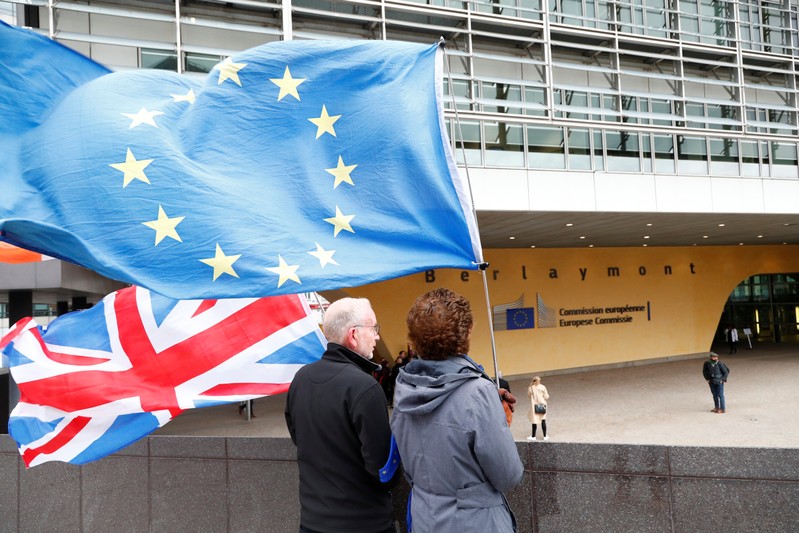
Anti-Brexit protesters hold British and European Union flags outside the EU Commission headquarters in Brussels, Belgium October 11, 2019. REUTERS/Francois Lenoir
October 11, 2019
LONDON (Reuters) – British companies doing businesses with the European Union are facing a lot more paperwork and costly new rules – ranging from customs checks to hiring new representatives in the EU – if the country leaves the bloc with no deal.
The government has ramped up its campaign to advise firms about Brexit which Prime Minister Boris Johnson insists will happen on Oct. 31 with or without a deal, despite a law aimed at forcing a delay if he fails to secure an agreement.
British tax officials estimate that in the event of a no-deal Brexit, the administrative burden on trade between Britain and the EU could cost 15 billion pounds ($19 billion) a year, damaging supply chains, consumers and businesses on both sides of the English Channel.
In 2018, exports from the United Kingdom to the EU were worth 289 billion pounds or 46% of all UK exports.
Below is some of the advice provided by the government on its “Get ready for Brexit” website: https://www.gov.uk/brexit
– You’ll need an Economic Operator Registration and Identification (EORI) number starting with GB to continue exporting goods.
Your importer will need an EU EORI number.
– Decide who will make the export declarations. You can hire someone to deal with customs for you, or you can do it yourself.
– You may be able to use the Common Transit Convention (CTC) to simplify how your goods pass through customs and when your importer pays customs duties.
– Your importer will need to pay tax and duty on your goods after Brexit. This will depend on the classification of the goods.
– Check what you need to do for the type of goods you export. There might be other things you need to do, depending on what you’re exporting.
– Find out how changes to VAT will affect you. Each EU member state has its own process for refunding VAT to businesses based outside the EU. You’ll need to use the process for the EU member state where you’re claiming a refund, even for unclaimed expenses you had before Brexit.
– Completing a customs declaration is complicated and you may need software. So you may want to get someone to deal with customs for you.
– Find a commodity code to classify your goods and look up duty rates, reliefs and quotas.
– In a no-deal Brexit, you may need to pay different rates of duty. Check the different rates when you know the commodity codes for your goods.
– If your employee is currently working in the EU, the EEA or Switzerland, contact the relevant EU social security institution to check if your employee needs to start paying social security contributions in that country, as well as in the UK.
– UK-based authorized representatives and responsible persons will no longer be recognized by the EU after Brexit. This is the case even if the good was placed on the market before Brexit day. You will need to appoint an authorized representative or responsible person based in the EU or EEA.
– Check if you need a vehicle operator license. You will need other licenses and permits, depending on the countries you’re driving to or through.
(Writing by William Schomberg; editing by Stephen Addison)

